Social perceptions of work and service as factors motivating young professionals in municipal services
The article is devoted to the analysis of social representations of “work” and “service” as key factors of motivation of young professionals in municipal service bodies. The relevance of the study is due to the need to attract highly motivated young personnel with innovative potential to improve the efficiency of local self-government. However, despite the steady scientific interest in the problems of management at different levels of government, the specifics of the municipal sphere, its attractiveness and motivation for young people remain insufficiently studied. The key problem is the contradiction between the need for personnel focused on public “service” and the prevalence of an instrumental attitude towards work as “job” that provides personal benefits among young people. The purpose of this article is to substantiate the social perceptions of “work” and “service” as factors motivating young professionals to enter municipal service. Based on data from sociological studies conducted by VTsIOM and the Russian Presidential Academy of National Economy and Public Administration in 1997-2025, the hypothesis about the dual nature of motivation was confirmed. It was revealed that pragmatic motives (prestige, stability, and connections) remain dominant, but there is an increase in the importance of the content and meaning of work (social utility and realization of potential). Young professionals want to see that their work is valuable and contributes to solving important social issues. The hypothesis about the growing importance of the content and meaning of work as factors of motivation was confirmed. The conclusions argue that in order to increase the attractiveness of municipal service, it is necessary not only to create comfortable conditions and increase the material support for employees, but also to actively promote the image of “service”. The success of personnel policy depends on the ability to combine pragmatic and meaningful approaches, providing young professionals with opportunities for professional self-realization and real impact on social processes.
Figures
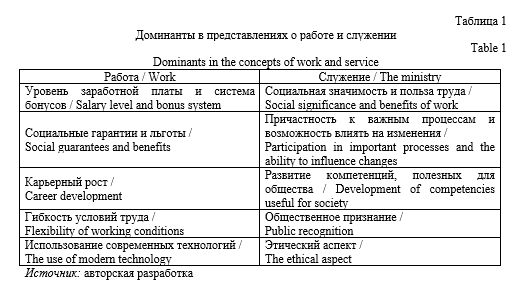
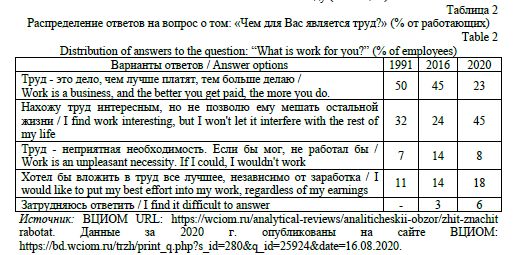
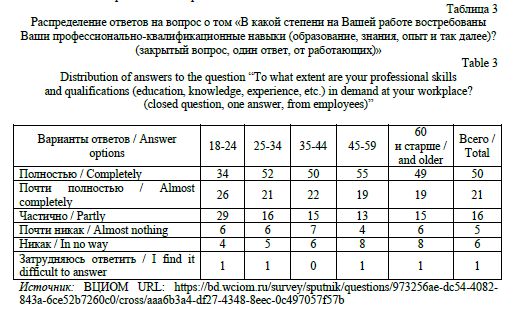
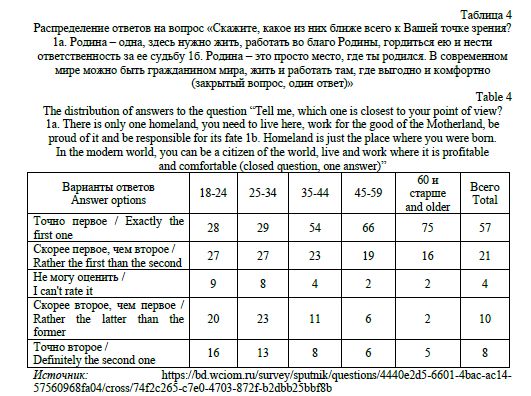
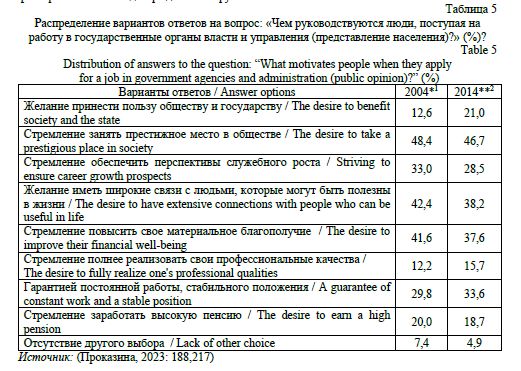
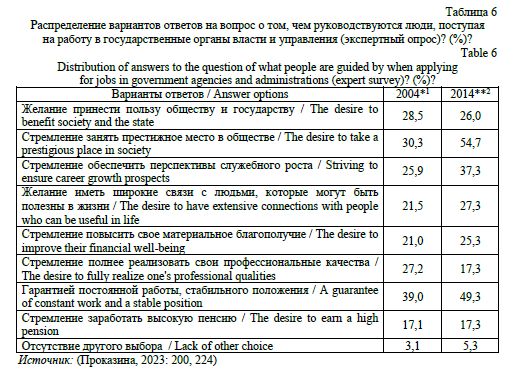
Prokazina, N. V. (2025), “Social perceptions of work and service as factors motivating young professionals in municipal services”, Research Result. Sociology and management, 11 (3), 316-332. DOI: 10.18413/2408-9338-2025-11-3-1-8.


















While nobody left any comments to this publication.
You can be first.
Belyaeva, L. A. (2020), “Generation Y in Russia: social stratification, labor market position, and problems of political socialization”, Ekonomicheskie i sotsialnye peremeny: fakty, tendentsii, prognoz, 13 (4), 220-237, DOI: 10.15838/esc.2020.4.70.13, EDN: FPBVAO. (In Russian)
Boikov, V. Je. (2007), Narod i vlast: rezultaty sotsiol. monitoringa: 1999-2006 gg. [The people and the government: the results of sociol. Monitoring period: 1999-2006], RAGS, Moscow, Russia. (In Russian)
Gnatyuk, M. A., Pechkurov, I. V. (2015), “Key risks of the transformation of Russian youth's labor values and their social consequences”, Istoricheskaya i sotsialno-obrazovatelnaya mysl, 7 (8), 97-102, DOI: 10.17748/2075-9908-2015-7-8-97-102, EDN: VOTITD. (In Russian)
Demidov, N. N. (2021), “The value orientations of Generation Z: a sociological analysis”, Akademicheskaya mysl, 2 (15), available at: https://cyberleninka.ru/article/n/tsennostnye-orientatsii-pokoleniya-z-sotsiologicheskiy-analiz (Accessed 07 August 2025). (In Russian)
Doktorov, B. Z., Zborovsky, G. E. (2021), “A generational approach to contemporary Russian sociology as a theoretical problem: national and regional aspects”, Sotsiologicheskie issledovaniya, (11), 79-90, DOI: 10.31857/S013216250015742-9, EDN: JIGGFM. (In Russian)
Zinurova, R. I., Nikitina. T. N., Fathullina, L. Z. (2022), “Social practices and socio-psychological characteristics of Generation Z (based on the results of a focus group study)”, Vestnik Tomskogo gosudarstvennogo universiteta, (476), 146-158, DOI: 10.17223/15617793/476/16, EDN: WNOHVA. (In Russian)
Zinchenko, G. P. (2016), “Public service in the field of sociology”, Sotsiologicheskie issledovaniya, (2), 70-75. (In Russian)
Zlotkovsky, V. I. (2024), “The problem of finding an optimal model for local self-government in the Russian Federation (sociological analysis)”, Vestnik Rossyskogo universiteta druzhby narodov. Seriya: Sotsiologiya, 24 (3), 684-698, DOI: 10.22363/2313-2272-2024-24-3-684-698, EDN: DWONKG. (In Russian)
Zubko, D. V., Kljuev, Ju. V. (2022), “Generational theory in the focus of values: on the feasibility of applying the generational concept in strategic planning”, Mir nauki. Sotsiologiya, filologiya, kulturologiya, 13 (3), available at: https://sfk-mn.ru/PDF/02SCSK322.pdf (Accessed 07 August 2025). (In Russian)
Zubok, Ju. A., Chuprov, V. I. (2019), “Self-regulation of the image of work in the cultural space of young people”, Ekonomicheskie i sotsialnye peremeny: fakty, tendentsii, prognoz, 12 (6), 243-259, DOI: 10.15838/esc.2019.6.66.14. (In Russian)
Kuznetsov, A. M. (2025), Etika gosudarstvennoy i munitsipalnoy sluzhby: uchebnik i praktikum dlya vuzov [Ethics of Public and Municipal Service: Textbook and Workshop for Universities], Yurait, Moscow, Russia, ISBN 978-5-534-21674-5, available at: https://urait.ru/bcode/581899 (Accessed 07 August 2025). (In Russian)
Magomedov, K. O. (2015), Mestnoe samoupravlenie v Rossyskoy Federatsii: problemy funktsionirovaniya i razvitiya. Materialy Sotsiologicheskogo issledovaniya (Oktyabr – dekabr 2014 goda) [Local self-government in the Russian Federation: problems of functioning and development. Materials of a sociological survey. October – December 2014], Moscow, Russia. (In Russian)
Magomedov, K. O., Turchinov, A. I. (2007), Gosudarstvennaya sluzhba i kadrovaya politika: teoriya i praktika: informatsionno-analiticheskie materialy po rezultatam Sotsiologicheskih issledovany, provedennyh kafedroy gosudarstvennoy sluzhby i kadrovoy politiki Rossyskoy akademii gosudarstvennoy sluzhby pri Prezidente Rossyskoy Federatsii v 2001-2006 godah [Public service and personnel policy: theory and practice: information and analytical materials based on the results of sociological research conducted by the department of public service and personnel policy at the Russian Presidential Academy of Public Service in 2001-2006], Pechatnyj dvor, Ul’yanovsk, Russia. (In Russian)
Pevnaya, M. V., Tarasova, A. N., Yakubova, Je. R. (2023), “Civil participation of young people in small territories of Russia's major industrial region”, Vestnik Rossyskogo universiteta druzhby narodov. Seriya: Politologiya, 25 (3), 722-737, DOI: 10.22363/2313-1438-2023-25-3-722-737, EDN: SAEZFX. (In Russian)
Petukhov, R. V. (2023), “Features of building trust in municipal authorities among young Russians”, Sotsiologicheskaya nauka i sotsialnaya praktika, 11 (4), 134-155, DOI: 10.19181/snsp.2023.11.4.6, EDN: GTYSBY. (In Russian)
Prokazina, N. V. (2023), Sotsiologiya gosudarstvennoy i munitsipalnoy sluzhby. Uchebnoe posobie. Chast II [Sociology of state and municipal service. Textbook. Part II. Information and analytical materials], Izdatelstvo Srednerusskogo instituta upravleniya – filiala RANHiGS, Orel, Russia, ISBN: 978-5-93179-770-0. (In Russian)
Prokazina, N. V. (2018), “Young officials in the region: views and attitudes on professional activity’”, Izvestiya Tulskogo gosudarstvennogo universiteta. Gumanitarnye nauki, (4), 62-71, EDN: YPNCLB. (In Russian)
Radaev, V. V. (2019), Millenialy: Kak menyaetsya rossyskoe obshhestvo [Millennials: how Russian society is changing], Izd. dom Vysshey shkoly ekonomiki, Moscow, Russia. ISBN 978-5-7598-1985-1 (print), ISBN: 978-5-7598-2009-3 (e-book). (In Russian)
Sizganova, E. Ju., Kaidashova, A. K., Chikova, I. V. (2020), “Analysis of the value orientations of future civil servants in the context of modern challenges”, Perspektivy nauki i obrazovaniya, 1 (43), 258-270, DOI: 10.32744/pse.2020.1.18, EDN: MSNNSS. (In Russian)
Sociodigger [Sociodigger] (2020), Avgust, 1(1): Trud i zanyatost, available at: https://book.wciom.ru/books/book-page/sociodigger-ezhegodnik-vciom-2020 (Accessed 07 August 2025). (In Russian)
Tychinina, M. I., Rikel, A. M. (2024), “Methodological analysis of the concept of “Generation” in social psychology: classical, non-classical, and post-non-classical generational theories”, Teoreticheskaya i eksperimentalnaya psikhologiya, 17(4), 146-165, DOI: 10.11621/TEP-24-37, EDN: JGSTOM (In Russian)
Shabunova, A. A., Uhanova Ju. V., Kosygina, K. E. (2023), “Youth civic participation in the region: opportunities and limitations”, Zhurnal sotsiologii i sotsialnoy antropologii, 26 (1), 167-199, DOI 10.31119/jssa.2023.26.1.7, EDN: MGQIYQ. (In Russian)
Shapovalova, I. S. (2025), “Strategies for the self-realization of regional youth: dispositions, life plans, and stratification”, Srednerussky vestnik obshhestvennyh nauk, 20 (1), 124-142, DOI: 10.22394/2071-2367-2025-20-1-124-142, EDN: YYKEUN. (In Russian)
Yadova, M. A. (2020), “The millennial generation in Russian society: in search of another youth”, Polis. Politicheskie issledovaniya, (6), 181-188, DOI: 10.17976/jpps/2020.06.14, EDN: URLUFT. (In Russian)
Howe, N., Strauss, W. (1997), The Fourth Turning: An American Prophecy – What the Cycles of History Tell Us About America’s Next Rendezvous with Destiny, Broadway Books, New York, USA, available at: file:///D:/Downloads/The_Fourth_Turning.pdf (Accessed: 30 July 2025).
The article is based on the results of research carried out at the expense of budget funds under the state assignment of the Financial University.